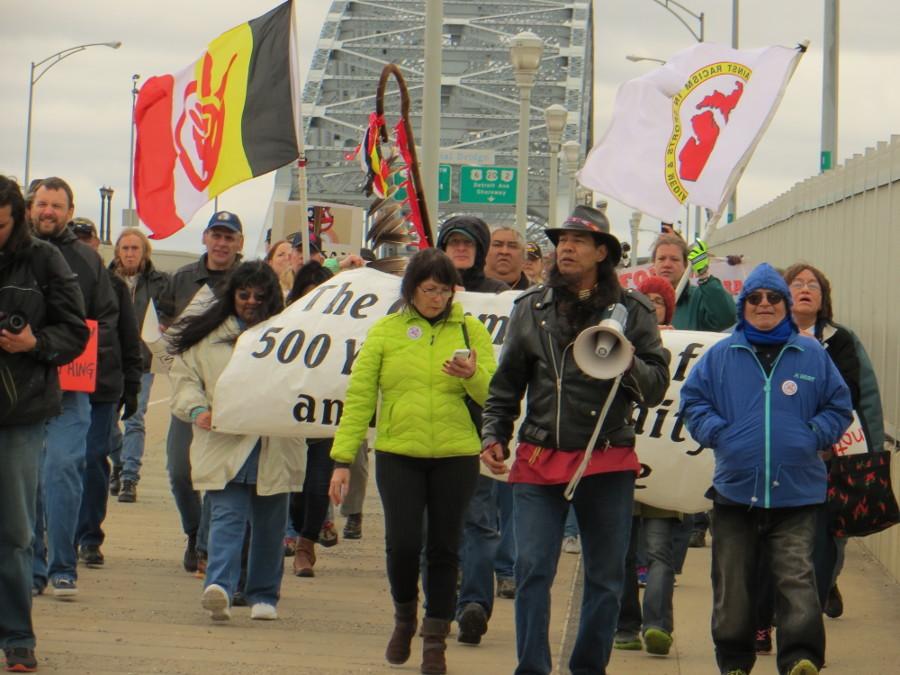March against the mascot
CWRU alum among opening-day protesters against the Indian’s Chief Wahoo
Protesters cross the Veteran’s Memorial Bridge en route to Progressive Field, home of the Cleveland Indians. The demonstrators finished their march at the stadium, carrying signs decrying the baseball team’s name and logo.
Last year an iconic photo brought the Cleveland Indians controversy to the national spotlight, and the issue hasn’t been forgotten yet.
The photo, published on an April 2014 cover of Cleveland Scene Magazine, featured a Native American man facing off against a baseball fan decked out in full red face makeup.
The Native American man was Robert Roche. Last Friday, he protested once again, with one of two groups of demonstrators. Roche and his group met outside of Progressive Field, home of Major League Baseball’s Cleveland Indians, as the team hosted the Detroit Tigers for the opener of their 2015 season.
Roche is highly vocal in his activism against the Indian’s name and mascot, Chief Wahoo.
The other protest was organized by the Committee of 500 Years of Dignity and Resistance. Their protest took place on the other side of the ballpark but with the same intent: to bring an end to the use of the name and logo of the Indians.
Roche’s event, titled “100 Years is Long Enough,” involved a march starting at W. 25th and Detroit Avenue. Similar to Martin Luther King Jr.’s march from Selma to Montgomery, this march crossed the Veterans Memorial Bridge (from Detroit Street to Superior Avenue) before heading down W. Hudson Street to Progressive Field. The name of the event recalls the history of the Indians’ name, as it was adopted for the 1915 season.
The group of roughly 30 protesters, accompanied by a Cleveland cop car, made the march from Detroit and W. 25th to the southwest corner of Progressive Field. The protesters carried signs, some wearing Native American attire while others were simply in modern clothing. They chanted varying sound-off cries for change. Toward the back of the march, wearing beaded earrings and a Case Western Reserve University warmup jacket was Kayla DeVault.
DeVault is an engineer at CWRU and used to run track. She is a Native American, a member of the Shawnee and Potawatomi Tribes. However, she prefers the original tribe name, Bodéwadmi.
“I am one of many Natives at CWRU,” said DeVault. “However we don’t stick out; we don’t look different, so no one knows we are different.”
This has been an ongoing issue for both DeVault and her fellow natives. When DeVault first came to campus she joined the American Indian Science and Engineering Society (AISES) and was effectively a member without a chapter.
She has since found her home and spoke of her current AISES president, who was told by his high school counselor that he was had no shot of succeeding in college. He ignored his counselor and is now working for NASA.
“People take one image, like an old western movie, and base their whole perception of our culture on it,” said DeVault.
DeVault spoke about how those identifications by the larger American public affect those who are Native. The images and perceptions led to low self-esteem, particularly for those who accept the stereotypical images of their culture, especially in the terms of sports.
“I used to love baseball,” said DeVault, “but then I came to school here and went to a free game, [and] I was given spirit wear. I looked at it and told my friend, ‘This doesn’t feel right.’”
***
Despite this ongoing Cleveland-based movement, and especially in the light of the outcry over the Washington Redskins’ name and mascot, many fans are opposed to changing the name, often focusing more on the club’s history than the origins of the name. The club has been around since the formation of the league and has a storied history.
“We are very cognizant and sensitive to both sides of the conversation—our fans’ deep, long-lasting attachment to the memories associated with Chief Wahoo and those who are opposed to its use,” the Indians said in a recent statement to the Associated Press. “We continue to research our fan base to better understand their perception and stance on the logo, but at present time have no plans of making a change.”
Some fans took their opposition to a different level, arguing with the protesters, shouting as they walked past to “Get over it!” and parading their team apparel past the protesters.
But the protesters had a response.
“We are people! Not your mascots!”
“Change the name! Change the Logo!”
These and a half dozen other chants preceded the small group. Not all the protesters were Natives. They were accompanied by allies, those from other ethnicities who agree with their cause, both white and African Americans. One of the leaders of the group, Charlene Teters, a member of the Spokane Tribe, has been protesting against the Indians name and logo for decades.
“We believe that our presence here alone challenges their complacency.”


